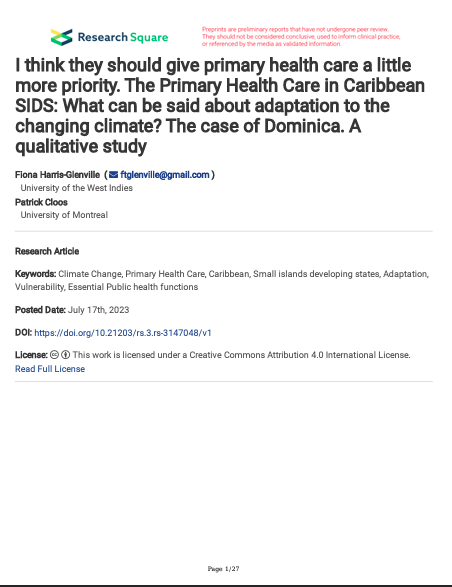I think they should give primary health care a little more priority. The Primary Health Care in Caribbean SIDS: What can be said about adaptation to the changing climate? The case of Dominica. A qualitative study
Background
Climate change (CC) adaptation is considered a priority for Caribbean Small Islands Developing States (SIDS), as these territories and communities are considered particularly vulnerable to climate-related events. The primary health care (PHC) system is an important actor in contributing to climate change adaptation. However, knowledge on how PHC is prepared for CC in Caribbean SIDS is very limited. The objective of this paper is to discuss health adaptation to climate change focusing on the PHC system.
Methods
We explored the perspectives of PHC professionals in Dominica on climate change. Focus group discussions (FGDs) were conducted in each of the seven health districts in Dominica, a Caribbean SIDS, between November 2021 and January 2022. The semi-structured interview guide was based on the Essential Public Health Functions: assessment, access to health care services, policy development and resource allocation. Data coding was organized accordingly.
Results
Findings suggest that health care providers perceive climate change as contributing to an increase in NCDs and mental health problems. Climate-related events create barriers to care and exacerbate the chronic deficiencies within the health system, especially in the absence of high-level policy support. Healthcare providers need to take a holistic view of health and act accordingly in terms of disease prevention and health promotion, epidemiological surveillance, and ensuring the widest possible access to health care, with a particular focus on the ecological and social determinants of vulnerability.
Conclusion
The Primary Health Care system should be a key actor in designing and operationalizing adaptation and transformative resilience. The Essential Public Health Functions should integrate social and climate and ecological determinants of health to guide primary care activities to protect the health of communities. This indicates a need for improved research on the linkages between climate events and health outcomes, surveillance, and development of plans that are guided by contextual knowledge in the SIDS.
Members and SHERPA Teams
Patrick Cloos
Professor, École de travail social Université de Montréal (UdeM)

